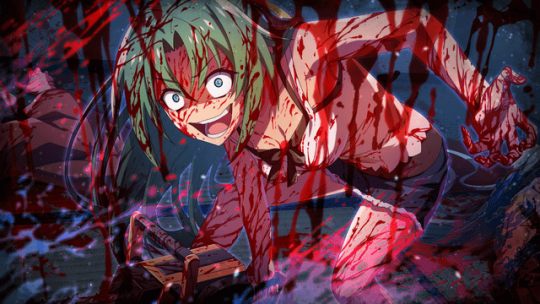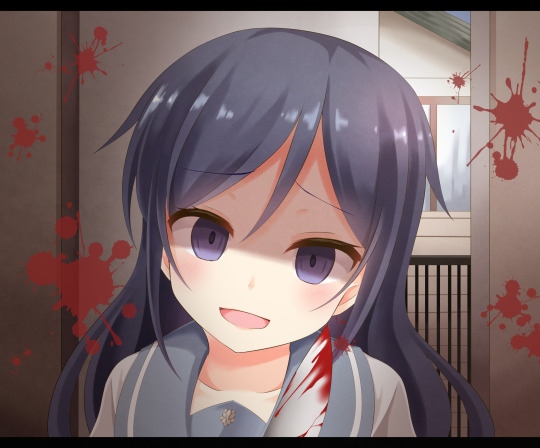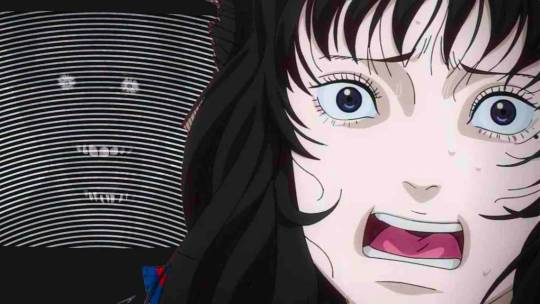#9 psych one of my few live action obsessions and
Explore tagged Tumblr posts
Text
ya know it’s funny i love hetalia but like it’s not my biggest obsession still in top five and it’s still the one i love drawing the most and thats something it has above everything else.
#i fuckign love legend of zelda above all else#i fucking love it absorb it like air it's all aroudn me yet i barely draw it and idk why it used to be all i drew as a kid and how i learned#to draw growing up but now its like gotta draw these country ppl lol#if i had to rank my obsession 1.zelda 2. kingdom hearrt 3 hikaru no go 4. spiderman 5.hetalia#kit'slifenshit#just for fun lemme do top ten too#6. sander sides 7. danny phantom#8. tales of the abyss specifically i haven't played the other games much#9 psych one of my few live action obsessions and#10 betty boop#fucking love all these shits
1 note
·
View note
Text
TOP 10 FAMOUS YANDERE IN ANIME

When we watch anime, we encounter a rich tapestry of characters, each one embodying a specific archetype, a trait, or a stereotype. However, few character types have captured the imagination and morbid fascination of fans quite like the yandere. At first glance, they might seem like the ideal partner – loving, attentive, and utterly devoted. But, hidden beneath that veneer of affection lies a dark undercurrent of obsession, madness, and sometimes, violence. As we journey into the world of the yandere, tread lightly, for love here isn't just blind—it's often dangerous. Join us as we delve deeper into the psyche of some of anime's most iconic yandere characters, exploring the twisted love stories and the fine line between passion and possession.
1 Yuno Gasai from "Mirai Nikki" (Future Diary): Yuno's extreme love and obsession for Yukiteru Amano are central to the story.

2 Kotonoha Katsura from "School Days": Kotonoha's descent into madness due to her love for Makoto Ito is one of the most memorable aspects of the series.

3 Shion Sonozaki from "Higurashi no Naku Koro ni" (When They Cry): Driven to madness by her love for Satoshi Houjou.

4 Rena Ryuuguu from "Higurashi no Naku Koro ni" (When They Cry): While not a traditional yandere, her intense behavior, especially in certain arcs, qualifies her for the list.

5 Satou Matsuzaka from "Happy Sugar Life": Her obsession with Shio Kobe, a young girl she believes to be her one true love, defines her character.

6 Kurumi Tokisaki from "Date A Live": Her yandere tendencies are especially evident when she's around the protagonist, Shido Itsuka.

7 Ayase Aragaki from "Oreimo" (My Little Sister Can't Be This Cute): While more of a yangire (a character who snaps suddenly out of jealousy or irritation), her obsessive tendencies can't be ignored.

8 Kaede Fuyou from "Shuffle!": Once the truth about her past surfaces, her yandere nature becomes clear.

9 Misa Amane from "Death Note": Her obsessive love for Light Yagami and willingness to do anything for his sake place her in the yandere category.

10 Sekai Saionji from "School Days": Her actions, particularly towards the end of the series, reveal her yandere nature.

As we conclude our journey into the captivating realm of yanderes, it's evident that these characters are more than mere vessels of madness and obsession. They embody the age-old debate of how far one might go for love and at what cost. Their stories serve as cautionary tales, reminding us of the thin line between affection and fixation, devotion and domination. While the yandere archetype may be a product of fictional storytelling, their essence resonates with many, leaving an indelible mark on the anime community. We may not always agree with their methods or their motives, but the yandere's complex blend of love, fear, and fervor will continue to intrigue and haunt us long after the screen fades to black.

#yandere nerd#yandere moodboard#yandere noncon#yandere obey me#yandere obsession#actually psychotic#yandere omori#yandere nct dream#yandere nsft#yandere oc#yandere things#obsessive yandere#yandere#yandere aesthetic#yandere alphabet#yandere anime#yandere art#yandere asks#yandere bf#yandere blog#yandere black butler#yandere bpd#yandere chan#yandere boy#yandere character#yandere community#yandere blurb#yandere confession#yandere concept#yandere cookie run
119 notes
·
View notes
Text
P S Y C H O P A S S
A U
I am obsessed with this, okay? please ignore my word vomit and scroll away (I can't seem to use the cut for some reason) Gomenasai!
Izuku cracking the exam like Akane Tsunemori and Katsuki being the Law Enforcer/ Latent Criminal with a police badge- (who is like 3 years older than Izuku). So the psychopass world is governed by this spontaneous cymatic brain scanner thingies which basically calculate your emotional state with a number (by a computer system called Sibyl, but here we'll call it A41) called Psychopass right? If this crime coefficient is above 100 it means you are likely to commit a crime (a Latent Criminal) and, the public safety bureau can paralyze you and imprison you, if over 300 it means you are lethal to society and they are authorized to kill you. And ofcourse they get their own cool Dominator guns to blast people to organic mush.
Psychopass is a fickle thing. When you are under stress it can shoot up easily, so regular mental care and strong minds are valued a lot in current society. Having a low psychopass or a ‘clear hue' is encouraged, while having a high psychopass or a ‘cloudy hue' is looked down upon. Criminals and Latent Criminals alike are considered harmful and recieve harsh treatment. They are not even considered human most of the times.
So enter newbie Midoriya Izuku, Inspector of the public safety bureau, who is supposed to learn the ropes under the guidance of his laconic senior Iida, an Inspector, as the newest member of Unit 1 MWPSB. Iida and Katsuki are always clashing and he refuses to believe that the Enforcers, being latent Criminals or ‘hunting dogs'( as they are referred to) are not to be trusted as they are sub-human. Shouto, Kyouka, Shinsou and Denki are also Enforcers like Katsuki who are appointed under Tenya and Izuku.
On their first case, Katsuki is haughty towards Izuku and constantly mocks him for his inexperience while chasing a criminal. He nicknames him Deku for being useless and letting the criminal get away. The search gets really intense and Katsuki proves himself to be a seasoned ‘hunting dog' to smoke out the criminal but his methods are near brutal. The criminal reveals his connection to the LoV when finally cornered and Katsuki flies into fury. During which Izuku is forced to paralyze Katsuki because his psychopass was skyrocketting on the chase and Izuku was afraid he'd exceed 300 and become a criminal irrevocably.
Katsuki has to be hospitalized and Izuku feels horrible as he let the criminal get away and hurt Katsuki. But Katsuki finally acknowledges that Izuku does have the balls to finally fire a Dominator gun, something he was reluctant to aiming at anyone before. But Katsuki says that firing a Dominator isn’t equivalent to earning the title of an Inspector, and that is something ‘Deku’ has to work for. Pouting at Katsuki's insistence to use that name, Izuku retaliates by calling him ‘Kacchan'. Katsuki almost breaks his bed restraints trying to get up and kick Izuku for such a cutesy nickname.
Izuku quickly understands that most Enforcers didn't approve of him yet, and even Katsuki ignores him for most of the time. He feels like they need him to prove himself in order to give him their acknowledgement. But as days go by and different cases are encountered, Unit 1 realizes that Izuku, with his unfaltering dedication, superb observation and analytical skills, is a force to be reckoned with. And if that weren't enough, Izuku reveals that he is an autodidact Mentalist – someone who is able to Trace the Criminal’s actions with exceptional psych profiling and sheer empathy. This makes Izuku's psychopass highly fluctuant- from single digits to numbers edging on 100. It makes him a little reckless and fearsome but the little Inspector soon makes friends with everyone except Katsuki, but Izuku, emboldened by his dear friend Uraraka’s advice, is determined to get him to open upto him.
Once, during a stakeout, when they are alone, Izuku tries to get Katsuki to open up and mentions why Izuku wanted to be an Inspector after Katsuki commented that he still considers his optimistic and cheerful personality inappropriate for the job.
Izuku tells him that as a child he was terribly sick all the time and he was really depressed because of it. Most children go through psychopass milestones like babies and toddlers have developmental milestones. Children are born with high psychopasses because they have yet to be integrated into society completely. It's one reason why A41 doesnt read psychopasses of children under 9 routinely, but once in 6 months. (Denki is also an example of a child whose pyschopass was abnormally high past the age of 10, and he was forced to become an Enforcer or go to jail, so he chose the former) Izuku's psychopass was too high for his age since he was 4 because of his extraordinary empathetic abilities, and people judged him superficially for it. His body was really weak too, and very few people knew that, so he was constantly bullied as well. When he was 9 he had to get brain surgery done so he was in the hospital a lot. Yagi Toshinori was admitted in the hospital around the same time and they became gast friends. The Inspector often enthralled Izuku with stories and cases, he often forgot Izuku's tender age and spoke of gruesome crime scenes to him as if it were natural to do so. Izuku, himself, was so awed by the courage and heroism of the Inspector that he has dreamt of becoming one himself since. Izuku ends by mentioning that after he finally went through the surgery, Toshinori never came back to see him again, but Izuku wanted to meet him. Katsuki grows pensive and remorseful at the name of Yagi Toshinori, which makes Izuku curious. When he asks if Katsuki knows the man, he is met with the curt answer, “ Toshinori is dead. Has been for a long while".
Shocked, Izuku gulps. He isn't too surprised to hear that because Toshinori was a very frail man when they had met. It was unlikely that he lived for long. But Izuku still cries profusely over him as Katsuki silently watches him sob and feels guilt rip through his chest.
There are countless times where Katsuki saves Izuku's life or reprimands Izuku for being so reckless, and each time, Izuku feels getting more intrigued and charmed by his explosive blond colleague. How can he not be? Especially after seeing how Katsuki takes down a combat bot with his bare fists at the training gym? (Izuku blushes a deep red, averting his eyes from sweat-glistened washboard abs and insisting that Katsuki wear a goddamn shirt because geez! You are so distracting, Kacchan!!!)
They grow close over the several life-threatening incidents they encounter. Izuku manages to get Katsuki to open up about the littlest of things and takes immense joy in each little successful interaction. Katsuki doesn't understand why Izuku is so happy for such small things, but it warms his cockles in an unfamiliar way. No matter how much he pushes it away, Izuku has wormed his way under his skin and made some kind of home in him. Katsuki eventually stops fighting this warm feeling.
Their relationship deepens over solving cases, they grow closer and closer. Katsuki starts to teach him how to fight, spars with him in training room. Katsuki comes to know that Izuku had a frail body and shot nerves (thus his high pain tolerance) and hardly any money for proper treatment. Izuku has put years of effort into overcoming his weaknesses. He might not be the strongest fighter, but he is efficient and knows to hit where it hurts. And frankly, Katsuki is impressed by his dedication. After a particularly exhausting case, when Izuku is bogged down about being too late to save some victims, Katsuki invites him to his quarters for some well-deserved dinner because Izuku has been running himself ragged without food for several days.
They start bonding over drinks and Katsuki finally feels it's time to tell Izuku about his past. He tells him how he was once a Inspector like Izuku himself, but because of his fault his senior, Enforcer Toshinori Yagi was murdered in a very gruesome manner. The perpetrators were related to LoV. The loss of his mentor and the associated trauma caused Katsuki's psychopass to rise beyond 100 and he was demoted to Law Enforcer. But despite that Katsuki continues his fervent search for the LoV. Izuku is shocked to hear this but he comforts Katsuki and tells him that he wants to help.
As their cases get harder to crack and Izuku starts spending more time with Katsuki, and he sees all the gruesome, traumatizing things that make his Psychopass climb steadily from stable 20s to 60s and so on – Iida confronts him and tells Izuku to stay away from Katsuki. He explains that Izuku is becoming more reckless, violent and brutal in his methods due to Katsuki, and although these methods always give results they are unreliable. but Izuku refuses to listen to him.
So an LoV related case comes up where Izuku gets seperated from the rest, Katsuki is going crazy to get him back and Izuku finally meets the guy behind the LoV, Tomura Shigaraki who has kidnapped Uraraka in an indirect attempt to lure out Katsuki buy baiting Izuku instead. LoV wants Katsuki to drop the investigation, maybe even lure him to their side since he has a penchant for destruction. Tomura threatens to kill Uraraka and goads Izuku to try and shoot him with the Dominator. However, the dominator refuses to acknowledge Shigaraki and his psychopass is shown unreadable. However, the dominator catches the psychopass of Uraraka, who under stress has a fatally high number. Izuku realizes the dominator will only hurt the victim and not Shigaraki. He refuses to wield the dominator, but Tomura goads him to shoot him anyway and throws an old-fashioned gun at him, urging him to make his own decisions instead of letting A41 making that decision for him.
For the first time ever since he fired a Dominator n Eliminator mode Izuku is torn about taking a life without A41's judgement.
Just when Katsuki breaks into the scene, he watches Izuku take the shot at Tomura. The shot grazes Tomura, but he is mostly uninjured. Uraraka is killed by Tomura. (r.i.p Uraraka T_T). Tomura escapes, but Izuku is a mess. He cannot accept that he tried to actually kill a person. Katsuki tries to comfort him, but soon Izuku's emotions swing from despair to cold rage.
At this moment Iida busts in and threatens Katsuki to stay away by aiming the Dominator at him
Katsuki tries to cover Izuku from the Dominator cause he knows Izuku's psychopass might exceed 100 right now in his emotional state. And it reads Katsuki's psychopass perfectly. But Izuku walks around Katsuki and in a quiet deadly fury he asks Katsuki to move away. Then he challenges the Dominator/A41 system to read his psychopass and give him a reason to believe that it works when it didn't work on Tomura.
Katsuki tries to drag him back but too late
The Dominator reads Izuku's pyschopass at it's highest limit 999. But before it can switch from the Non lethal paralyzer mode to Lethal Eliminator - Izuku's psychopass changes to 000.
Iida believes his Dominator is glitching. But Katsuki and Izuku both know from previous doubts that the A41 system is flawed and it cannot read psychopass of certain people.
Turns out, Izuku is one of them
(tbc?)
(i love the idea of them weilding Dominators)
#bkdk#bakudeku#psychopass bkdk au#psychopass#psychopass has me by the balls ok?#sorry#bnha fanfic idea
12 notes
·
View notes
Text
A Journal of the Plague
Originally published on the Doomstead Diner on April 5, 2020
"The taverns are fair full of gadabouts making merry this eve. Though I may press my face against the window like an urchin at a confectioner’s, I am tempted not by the sweetmeats within. A dram in exchange for the pox is an ill bargain indeed."
— Samuel Pepys, 1665
Watching Covid-19 unfold is like watching the approach of a slow motion catastrophe. We cannot run, nor hide. We can only wait. The math is immutable, and inexorable. The confirmed infection counts and death tolls double every three days. Tick-tock.
We are told to practice "social distancing," to wear masks, to wash our hands continuously, to not touch our faces, and most of all to #Staythefuckhome. Most do. Some, including notorious ignorami, assorted MAGATs, and fundamentalist preachers whose addiction to positive cash flow depends on filling their megachurches, do not. These people should be treated as if they want you dead, judging from their actions, they do.
On a warm spring day last weekend they could be found packing cars going God-knows-where, on sidewalks with kids in tow, even going house-to-house to talk to neighbors! Amidst all the people on their bikes taking advantage of a sweet spring day to go out and provide disease vectors for the unsuspecting, I noted that a friend posted on Facebook that the parking lots down at the Virginia Beach Oceanfront were absolutely packed. Leaving the cynical person to wonder, "what the hell is wrong with people?"
We are linear thinkers; we do not do the exponential function very well. (Part of the reason Einstein, when asked to identify the most powerful force he had seen in a lifetime of discovery, replied, “Compound interest.")
The very next day, Virginia Gov. Ralph Northam issued a stay-at-home order for Virginia in an effort to further stop the spread of the coronavirus. Better late than never.
Being first to lock the state down seems to have worked for California. I saw a clip by Gavin Newsom on TV saying as much, that the lockdown flattened the impact. He/they just had the good sense to employ the only weapon available. California bought themselves time, and kept the outbreak from swamping their health system. The less the infection penetrates the population in advance of a vaccine, the better.
My inner hunchback is waiting for karma to arrive in Arkansas, Missouri, Mississippi, and the other states that insist on staying "open for bidness" in the face of the trump Plague. I wish I were a better person. I am not.
In a recent book review, Charles Baxter observes,
Mania rules in many American classics. Like it or not, in what has been taken to be our national literature, the notable white male characters are often in the grip of obsession. From Captain Ahab, to Frank Norris’s McTeague, Fitzgerald’s Gatsby, Faulkner’s Thomas Sutpen, Nabokov’s Humbert Humbert, Philip Roth’s Portnoy, and James McBride’s John Brown, we are in the presence of men who want only one thing and have sold their souls to get it.
We are all maniacs now: maniacs to stay alive, to remain beyond the reach of a silent killer with near universal reach, and whose lethality will disproportionately affect the elderly and the infirm. And while we may not sell our souls, we have certainly turned our vigilance up to "10."
Samuel Pepys (pronounced: "Peeps"), a capable administrator of British naval affairs and Member of Parliament in the seventeenth century, kept a diary as a young man. He recorded his daily life for almost ten years, and his record is often regarded as Britain’s most celebrated diary.
Historians have for years been mining Pepys' insights about details of everyday life during the seventeenth century, as he documented the coronation of King Charles II and the Restoration, the Anglo-Dutch war, the Great Plague, and the Great Fire of London. It is his descriptions of the London plague years of 1655-66 that we care about here.
The Great Plague of London killed between 75,000-100,000, roughly 20 per cent of the population. Pepys' diary is filled wth what might today be called, "hot takes:"
On hearing ill rumour that Londoners may soon be urged into their lodgings by Her Majesty’s men, I looked upon the street to see a gaggle of striplings making fair merry, and no doubt spreading the plague well about. Not a care had these rogues for the health of their elders!
As noted above, on a clear weekend day I noted cars filled with people leaving the neighborhood… going where, exactly? And beheld the sight of a neighbor working out on another neighbor who had the good sense to hide behind a storm door while the sputum-deliverer held forth. I swear, had he crossed the street I'd have used a rake to oblige him to keep his distance.
Great fears of the Sickenesses here in the City, it being said that two or three houses are already shut up. God preserve us all.
We are all shut up in our houses now. Aside, that is, from a few states in the south and west who wish themselves part of the Neo-confederacy. Persuading an entire country to voluntarily stay at home is not easy, and without clear direction from an unwilling White House, mayors, governors, and business owners have rolled their own.
Thus this month ends, with great sadness upon the public through the greateness of the plague, everywhere through the Kingdom almost. Every day sadder and sadder news of its increase. In the City died this week 7496; and all of them, 6102 of the plague. But it is feared that the true number of the dead this week is near 10000 – partly from the poor that cannot be taken notice of through the greatness of the number, and partly from the Quakers and others that will not have any bell ring for them. As to myself, I am very well; only, in fear of the plague, and as much of an Ague, by being forced to go early and late to Woolwich, and my family to lie there continually.
The death toll in the US as of this writing is over 9100. The number of US confirmed cases is over 321,000. Look for these rates to double every three days until the disease peaks. Soon, most everyone in the US will know someone who has been infected. Like 9/11, the pandemic has already imprinted itself upon our psyche as a defining moment.
The pandemic has shattered the myth of American "greatness." As the first among equals of rich, strong, developed nations, the supremacy of American health care is held as an article of faith. That illusion has been shattered. In spite of months of advance warning as the virus tore through other countries, when America was finally tested by COVID-19, it failed.
Countries like South Korea, Singapore, and Hong Kong followed the playbook: develop a test, use it to identify the infected, isolate them, and trace those they’ve had contact with. Wash, rinse, repeat. As Alexis Madrigal and Robinson Meyer reported, the CDC developed and distributed a faulty test in February. No one could have imagined that as the American caseload shot into the tens of thousands, only hundreds of people would be tested. This created an epidemiological hole from which we have never emerged. Lack of a reliable test deployed early enough is the single point of failure that undermined every other countermeasure, and that has led to the immutable, exponential math.
Bet your mortgage that the impacts on economic, social and political aspects of our lives from coronavirus will be long lasting. And compounded, given the chaos, corruption, and cronyism that heralded our blundered entry into this crisis. Few have ever seen anything like this, and only a few cranks and miscreants (aside from professional planners) have even bothered to contemplate it.
The London plague continued into 1666.
Thanks be to God, the plague is, as I hear, encreased but two this week; but in the country in several places it rages mightily, and particularly in Colchester, where it hath long been, and is believed will quite depopulate the place.
Italy and Spain offer grim warnings about an American future. Hospitals are rapidly running out of room, supplies, and staff. Health-care workers are already seeing dwindling equipment, growing waves of patients, with doctors and nurses themselves becoming ill. And they are operating without a gaunt, shiny-faced, porcelain-doll wannabe-Dauphin to bollix up supplies of medical equipment, and to MBAsplain coronavirus to the nation's Governors. Trump and Bolton terminated the Pandemic staff and have given the portfolio to Richie Rich for on-the-job training. God help us all.
By 1667 Pepys' plague had burnt out, but still lived in recent memory:
One at the table told an odd passage in this late plague: that at Petersfield, I think, he said, one side of the street had every house almost infected through the town, and the other, not one shut up.
During a time of "social distancing," we are reduced to staring off the porch or out the window. Like the denizens of Plato's cave, we watch the electronic shadows dance off the wall, while we attempt to make sense of them. Even more difficult is imagining how we might begin to recover from a virtual shutdown of economic life. As we try to restart an all-but-stopped economy dependent upon an engine of ceaseless consumption, we run the risk of renewed disease flareups as seen in China, Singapore, and other Asian countries that briefly seemed to have the virus under control. All it takes is one case to reignite fresh infections.
My best guess is that until a vaccine can be produced (probably 18 months), we'll continue to play a protracted game of whack-a-mole with the virus, stamping out outbreaks as they occur.
The slow response to the virus by some Trumpophile governors will be telling. Virus hot spots in are South poised for disproportionate suffering. With many Southern states only recently implementing stay-at-home orders, there is a chance that a later wave of infection could swamp local facilities. Even sparsely populated counties could soon have more cases than their health care systems can handle.
“There is no city anywhere in the world that can withstand the outbreak that would occur if there isn’t rigorous social distancing,” said Tom Frieden, a former Centers for Disease Control and Prevention director.
In Virginia, the governor is both a Democrat and a physician, so he imposed social distancing earlier than some. But some children of privilege and exception haven't taken it seriously.
The Columbia University model also identified the area around Hampton Roads and Newport News, Va., at risk of having its health infrastructure swamped. Though the number of cases in those counties is currently low, Virginia is not expected to experience peak conditions until late May, and has so far received just a tiny fraction of the medical equipment requested from the federal government.
On Friday, state leaders confirmed that the tidewater region has some of the highest community spread in the state, and that it would be one of three areas designated for a field hospital to take pressure off the local medical system. The “alternate care” site in the Hampton Roads Convention Center will be able to hold up to 360 acute care beds or 580 non-acute beds, Gov. Ralph Northam said.
This Week in Doom:
Like the pandemic itself, the economic effects are just getting started. Strap in. Nobel-winning economist Paul Krugman sees unemployment soaring to 20% in a matter of weeks.
WE'RE NUMBER ONE! The US just recorded the highest single-day death toll in the world
Just when you thought it might be safe to peek out off your bunker… this asshole, again. Robertson Blames Coronavirus On Oral Sex, ‘Lady Chemicals’
Amid reports that the federal stockpile of medical supplies is “nearly exhausted” and production of new equipment is unlikely to come soon enough, it now appears that the Trump administration may be playing favorites, distributing supplies to political allies and states important for the president’s reelection campaign. How bad will the fallout be? Frank Rich: Trump’s Potemkin Recovery
Karma Comes to Cousinfuck Country. Mississippi Now Has the Highest Rate of Coronavirus Hospitalizations in the United States
Are there no lampposts? No nylon rope? New disclosure reveals Sen. Kelly Loeffler and her husband dumped retail stock and bought shares in a company that manufacturers medical supplies. Loeffler and her husband dumped hundreds of thousands in stocks before the market dropped over the coronavirus outbreak.
Trump's budget director stands by plan to cut CDC budget by 15 percent during the coronavirus pandemic The acting director of the OMB seemed unperturbed when asked about if it was wise to cut the CDC during a pandemic.
Karma, your table is ready. Liberty University Brings Back Its Students, and Coronavirus Fears, Too
Americans are doing what they do best: buying guns
For unbiased information, Just found this. No interpretations, no politics. Just data, visualized: https://covid19.healthdata.org
Stay informed and protect your own.
Surly1 was an administrator and contributing author to Doomstead Diner. He is the author of numerous rants, screeds and spittle-flecked invective here and elsewhere. He lives a quiet domestic existence in Southeastern Virginia with his wife Contrary. Descended from a long line of people to whom one could never tell anything, all opinions are his and his alone, because he paid full retail for everything he has managed to learn.
0 notes
Text
No more apologies.
CW: Frank discussion of mental health. Also. very long and disorganized writing.
-
-
-
-
-
This year has been pretty challenging because of a confluence of several unrelated matters. By large, though, the perfect storm of events that took place since a year ago and now has taken a serious toll on my mental (and physical, to an extent) health. I am slowly recovering from all this as of this writing, but all this spring and summer I was not able to motivate myself to do anything at all.
In retrospect, the signs were there. I no longer enjoyed engaging in activities that I once loved to do. I was sleeping too much and even then I was exhausted a few hours later. I was, from time to time, bordering on the paranoid, having my anxiety to be debilitating.
Often I questioned why I am here, what in the hell I am doing, and any prospect for a better future.
I’ve wasted a large bulk of my lifetime, mostly trying to survive and nothing more. I had a long history of homelessness as an adult. When I was still newly on the street, I dreaded every evening and boredom was unbearable. The only goal in my life was to make another day fly by me as fast as possible so I could survive one more day. That was most of my life during my 30s.
I have never had a normal childhood and I have never had a normal adult life. That sometimes causes me an inferiority complex, when the kids who graduated from my high school the same year have already built respectable careers, earned multiple postgraduate degrees, and making families and children.
To add to this, the last three years in the United States have done a lot of damage to my own psyche. Having been exposed to the daily barrage of news about hate crimes, racist terror, institutionalization of extreme homophobia at the highest level of the government, and ethnic cleansing policy from the top, I have internalized so much of racism, classism and homophobia into my subconscious. Frankly, before the rise of Trump, I had not given much thought about discrimination or hate despite my being a member of the marginalized minorities. Now no day will pass without at least thinking about it.
I know that people around me are barely tolerating me, perhaps out of pity, perhaps out of their own guilt. Nobody has really liked me, and even though from time to time I made an attempt to be “likable,” I’ve given up on that prospect.
I tried to get a date and get laid for years in vain, but now I realize that I was doing all that (1) out of curiosity, and (2) because “everyone else is doing it.” I had internalized the rather heteronormative (and assimilationist) social narrative that relationship is good, romance is good, and everyone’s goal should be marriage and family. Fuck that.
Now I firmly believe that I am aromantic, and it makes sense because as an autistic I cannot relate to people like normies might.
People look at me with disgust, and I know I creep them out. They obviously try to be polite and don’t tell me that in my face but I am not fooled.
For too long I longed to be normal. I wanted to be one of the normies. I wanted to be accepted. I wanted to be taken seriously.
Being taken seriously meant freedom. It also meant more income. More opportunities. More friends. Maybe more sex.
But I am starting to see the error in my thinking, because of two recent events.
1. Recently I attended an all-day conference called Build and Monetize. It was a conference geared toward consultants and other entrepreneurs. One thing I learned was that almost everyone thinks they’re not being taken seriously (”impostor syndrome”). The other thing is that I don’t have to market myself to the “normies” but rather I could play on my own difference (now working on this!) -- no more trying in vain to compete.
2. Like you, I have been following Greta Thunberg. It’s hard now to believe that merely a year ago, she organized a “School Strike for the Climate” at the Swedish Parliament and NOBODY showed up (like almost all of the events I had organized so far!). She just stood there alone. In 2019, she’s met Barack Obama, gave a speech in the United Nations, and is a leading voice of the youth climate movement and the global conscience. Her one-person protest has grown to one of the largest mass demonstrations in world history, ranking at par with the Women’s March on Washington (2017) and Occupy Wall Street (2011). I really wished I was her when I was 15. Like Greta, I was already very much politically and socially conscious at that age. Despite the haters (mostly the right-wing, how predictable) and critics feigning compassion, Greta actually was the right person to be doing this.
“She admitted her passion was partly down to viewing the world in stark terms. The result of her simplistic approach, fuelled by her condition, is that she has presented this issue with more clarity and competence than almost any adult activist or politician in recent years. And there is something rather beautiful in hearing this teenager demonstrate by her actions how society is stronger when it embraces difference – a message that seems so pertinent to our troubled age. Indeed, this aspect of her stance as a now-public figure on the autism spectrum is arguably as important as her bold stand on climate change, given many prevailing attitudes.“ -- The Guardian, April 23, 2019.
I don’t believe like some that autistic people are some new “supergroup” that will save the world. I think we’ve always been here. But I do think our clarity, moral outrage, allergy to bullshit and refusal to go along are some of the many disabled skills that can be part of saving the world. -- Truth Out, Sept. 25, 2019.
A few years ago, Thunberg’s ascent to fame likely would have been framed in the media as that of an inspiring young girl “overcoming” her disability to become the leader of a worldwide movement. But Thunberg herself makes a different, more radical argument: that she became an activist not in spite of her autism but because of it. “I see the world a bit different, from another perspective,” she explained to New Yorker reporter Masha Gessen. “It’s very common that people on the autism spectrum have a special interest. … I can do the same thing for hours.” Thunberg discovered her special interest in climate change when she was just 9 years old, and she couldn’t understand why everyone on the planet wasn’t similarly obsessed with preventing it.A visceral feeling of repulsion toward deceit and hypocrisy is also common among people on the spectrum. As Thunberg told the BBC, “I don’t fall for lies as easily as regular people, I can see through things.” She has a particular contempt for the professional propagandists and apologists who prop up the fossil fuel industry and discourage the development of renewable energy resources, dismissing UK claims about reductions in carbon emissions as the result of “very creative accounting.” -- Vox, Sept. 24, 2019.
In fact, Greta Thunberg may have been the absolute best thing that happened to the autistic community in modern history, when most people’s perception of autism was pretty much shaped by the film Rain Man and propaganda from Autism Speaks.
At the very least, Greta is my inspiration. (And despite what the haters think, she is beautiful and her face almost reminds me of a classical Greek or Roman sculpture. She could as well be a Greek goddess incarnate.)
Back to the topic, I feel that I’ve wasted good two decades of my life trying to fit in and be “respected” (read: act and speak like normies, according to the white cisheteronormative middle-class standard of “respectability”), and engage in activities that normies might find “respectable.”
Between apologizing for being “abnormal” and internalizing ableism, classism, racism, sexism, and heterosexism, I had wasted so much of my creativity and energy on this uncompensated labor to make people around me “comfortable” so they might “accept” me.
Fuck that. I’m done living my life like this, so as to please the normies for a pittance in return (and mostly uncompensated).
They never understand me anyway. They have never walked a tenth of a mile in my shoes at the intersection of multiple oppressions. They may be well-meaning but their privilege means ignorance, self-righteousness, meaningless virtue-signalling circle jerk, and unwillingness to learn (and it’s not my responsibility to “educate” them without compensation, either).
And yes, history of “mental health” is history of colonialism and racism, too. What many non-Western and pre-Christian Western cultures called it shamanic gifts or witchcraft, the Christendom called it “hysteria” and “lunacy.” (Note: I have studied cultural anthropology of shamanism as a purely academic subject for two semesters. I do not purport to be a shaman nor it is my intention to appropriate their traditions.)
I am instead going to quadruple down on my “craziness,” and I will no longer apologize for it. (For the most part, “mental health” in our society is just a mechanism to enforce social order and norms -- if there be any question on this, ask why it is always the police that responds to mental health “emergencies” and not EMTs.) I am turning the landmine that it my “craziness” into a goldmine instead.
And fuck the normies.
0 notes
Text
The Happiness Hypothesis: Chapter 9, “Divinity with or without God”
This chapter was about our perception of divinity, which Haidt claims is an important part of human psychology whether or not God exists.
He starts with two quotes about how we need to seek nobility or divinity in order to live good lives:
Meng Tzu: We must not allow the ignoble to injure the noble, or the smaller to injure the greater. Those who nourish the smaller parts will become small men. Those who nourish the greater parts will become great men.
Muhammad: God created the angels from intellect without sensuality, the beasts from sensuality without intellect, and humanity from both intellect and sensuality. So when a person's intellect overcomes his sensuality, he is better than the angels, but when his sensuality overcomes his intellect, he is worse than the beasts.
But this chapter wasn't really about how to live a good life. It mostly just explained what the divinity dimension is, where it came from evolutionarily, and why it's important to human psychology.
According to Haidt, there are two familiar dimensions along which we relate to each other: closeness and hierarchy. These govern our interactions with one another (we behave differently to close friends than we do to strangers, and we behave differently to our superiors than we do to our subordinates).
But there's also a third dimension, a specifically moral dimension that he calls "divinity", that also affects how we relate to other people. To put it shortly, some people (regardless of their closeness to us or their social status) are simply more spiritually pure.
This "divinity" dimension appears cross-culturally, though WEIRDerners often have trouble perceiving it.
To be honest, I don't fully understand this chapter. This outline is an attempt to make sense of it to myself. For that reason, I'm not going to follow Haidt's chapter organization as closely as usual.
Apparently, the divinity dimension is rooted in our instinct towards disgust.
Disgust
Disgust, as an instinct, "is largely about animals and the products of animal bodies (few plants or inorganic materials are disgusting)". Disgusting things include blood, excrement, snot, vomit, and other bodily fluids.
Disgust spreads by contagion. Something that touched something disgusting is also, by extension, disgusting. For this reason we are grossed out by rats, cockroaches, and other animals that live in garbage.
Disgusting things make us want to perform purifying actions, "such as washing or, if it's too late, vomiting".
"Disgust has its evolutionary origins in helping people decide what to eat." As humans got smarter, we also started eating more meat (including scavenged carcasses), which exposed us to more disease. Plants can't contaminate other things by touching them ("[i]f a poisonous berry brushes up against your baked potato, it won't make the potato harmful or disgusting"), but rotting meat and excrement can. So the feeling of disgust helps us track this contamination. Haidt describes disgust as a "guardian of the mouth".
Disgust also protects us from disease. We're grossed out by bodily fluids like blood, excrement, and mucus, which are likely to be carrying disease.
Disgust "guards the body more generally". We're disgusted by unattractive, undesirable mates. We're also disgusted by "skin lesions, deformities, amputations, extreme obesity or thinness, and other violations of the culturally ideal outer envelope of the human body".
It makes sense that disgust would expand from guarding the mouth to guarding the rest of the body, since humans have always lived in dense groups where it's easy to spread disease.
Categories of disgust: "food, body products, animals, sex, death, body envelope violations, and hygiene".
Disgust and Morality
"But the most fascinating thing about disgust is that it is recruited to support so many of the norms, rituals, and beliefs that cultures use to define themselves."
The point seems to be that we use disgust when reasoning about morality.
Human and Animal
Humans are thought to be higher than animals along the dimension of divinity. And we measure how "animal" an action is by how much it disgusts us (e.g. eating with our hands). Therefore, every time we do something disgusting, it brings us closer to being animal, thereby reducing our divinity.
So in order to assert our humanness, we are careful to perform biological processes in cordoned-off, socially sanctioned ways. We wear clothes to cover the "animal" parts of our body. We pee and poop and have sex in private. We enforce table manners to make eating into a less animal thing. (My mom used to tell me to "eat like a human being".)
Disgust is the emotion that enforces these behaviors. People who break these norms are disgusting. If we do or see people violating these taboos, we feel degraded; we feel ourselves being lowered on the axis of divinity.
Purity and Pollution
Most cultures attach moral significance to physical pollution.
It's considered immoral to pollute the body in various ways (such as violating food taboos, or performing forbidden sexual acts). (I guess Haidt's argument is that violating these taboos makes us more animal, and lowers us on the scale of divinity, which reaches up from animal to god?) Haidt never mentions this, but the moral obsession with virginity seems like a good example of this.
People who are already polluted are forbidden from taking part in holy activities. For instance, "women in many cultures [are] forbidden to enter temples or touch religious artifcats while they are menstruating, or for a few weeks after giving birth". The Laws of Manu tells Brahmins that they shouldn't even think of reciting holy scripture while pooping or peeing, or "when food is still left on [their] mouth or hands", or when "in a cremation ground", or "while wearing a garment that [they have] worn in sexual union", etc.
Haidt tells of the temples in Bhubaneswar, which are sacred spaces in the Mircea Eliade sense. At most temples, Haidt was allowed into the courtyards, and he could enter the antechambers as long as he removed his shoes and any leather items. But because he is not a Hindu, he was not allowed into the inner sanctum. They weren't trying to keep it a secret, they were just trying to keep it from being polluted by "people such as [Haidt] who had not followed the proper procedures of bathing, diet, hygiene, and prayer for maintaining religious purity".
Everything in Bhubaneswar is suffused with this sacredness dimension. Places can be more or less sacred (the inner sancta of temples being the most sacred), and so can parts of the body (the head and right hand are more pure, the feet and left hand are polluted).
Other
Immoral acts evoke a disgust reaction, and make us feel less pure, even when they have nothing to do with the physical body or the distinction between humand and animal.
"When people use the ethic of divinity, their goal is to protect from degradation the divinity that exists in each person, and they value living in a pure and holy way, free from moral pollutants such as lust, greed, and hatred."
Physical pollution is thought of as akin to moral pollution.
Physical purity is thought of as akin to moral purity.
Sacred Intrusions
The dimension of divinity is prominent in Bhubaneswar where Haidt did fieldwork.
But it was also prominent in America in Victorian times.
According to Mircea Eliade, all cultures have an idea of sacred and profane space, time, and activities. Purity / pollution marks the boundary between the sacred and the profane.
WEIRD culture is the first culture to ignore sacredness, and to live in a world that is fully profane.
But even in modern America, we perceive sacredness in certain personally significant places ("a man's birthplace, or the scenes of his first love, or certain places in the first foreign city he visited in his youth").
But these are discovered by the individual, not specified by the culture.
Disgust and degradation are the emotions we feel when we see something low on the scale of divinity. But elevation and awe are the emotions we feel when we see something high on that dimension.
Elevation
Elevation is the feeling we experience when we see someone do a really good deed.
We tend to feel it in the heart, or as a "dilation" of the chest.
It sometimes involves feelings of chills, or of choking up.
When people experience elevation, they feel motivated to good deeds also, or to become a better person.
Haidt and his students have studied elevation in the lab.
They evoke it using "clips from documentaries about heroes and altruists, and selections from the Oprah Winfrey show".
Elevation is different than "admiration for nonmoral excellence".
"Subjects in the admiration condition were more likely to report feeling chills or tingles on their skin, and to report feeling energized or 'psyched up.' Witnessing extraordinarily skillfull actions gives people the drive and energy to try to copy those actions."
“Elevation, in contrast, is a calmer feeling, not associated with signs of physiological arousal."
People in the studies say they want to do good deeds, but they are no more likely than others to help a researcher who has dropped a stack of papers.
This may be because elevation influences the vagus nerve, which controls the parasympathetic nervous system, calming people down and making them less prone towards action.
This would explain why people associate elevation with the heart. "The vagus nerve is the main nerve that controls heart rate, and it has a variety of other effects on the heart and lungs, so if people feel something in the chest, the vagus nerve is the main suspect, and it has already been implicated in research on feelings of gratitude and 'appreciation.'"
(But the vagus nerve is hard to measure, so there's no conclusive evidence of this yet.)
The vagus nerve is associated with the hormone oxytocin. "The vagus nerve works with the hormone oxytocin to create feelings of calmness, love, and desire for contact that encourage bonding and attachment."
Haidt's student Jen Silvers wanted to see whether elevation influenced oxytocin. oxytocin is known to increase lactation, so Haidt and Silvers brought a bunch of lactating women into the lab and showed them a video that would induce elevation. almost half the women leaked milk, or nursed their babies after watching the video, and also played more warmly with their babies. whereas only a couple women in the control condition, where they watched an amusing video, leaked milk or fed their babies.
If elevation is associated with oxytocin, this could explain why people feel motivated to do good deeds but aren't actually more likely to do them. "Oxytocin causes bonding, not action. Elevation may fill people with feelings of love, trust, and openness, making them more receptive to new relationships; yet, given their feelings of relaxation and passitivty, they might be less liekly to engage in active altruism toward strangers."
A reader wrote Haidt a letter, saying he shed two kinds of tears in church. The first was tears of compassion, which felt like "'being pricked in the soul,' after which 'love pours out' for those who are suffering". But the other was tears of elevation or celebration, which "'is also like being pricked, only now the love pours in'".
This could explain what Christians mean by "referenes to Christ's love and love through Christ". Going to church could cause people to experience elevation, where they feel the goodness of Christ and feel his love pouring into them. "[B]ut it is not exactly the love that grows out of attachment relationships. That love has a specific object, and it turns to pain when the object is gone. This love has no specific object; it is agape. It feels like a love of all humankind, and because humans find it hard to believe that something comes from nothing, it seems natural to attribute the love to Christ, or to the Holy Spirit moving within one's heart."
Awe
Awe is the other emotion that moves us up on the dimension of divinity.
Awe is evoked by the vastness and beauty of nature, or by "viewing great art, hearing a symphony, or listening to an inspiring speaker".
Haidt says: "In chapter 1, I wrote about the divided self -- the many ways in which people feel as though they have multiple selves or intelligences that sometimes conflict. This division is often explained by positing a soul -- a higher, noble, spiritual self, which is tied down to a body -- a lower, base, carnal self. The soul escapes the body only at death; but before then, spiritual practices, great sermons, and awe at nature can give the soul a taste of the freedom to come."
Awe can also be evoked by psychedelic drugs, which make people feel like they are experiencing the presence of God.
Awe is "link[ed] to fear and submission in the presence of something much greater than the self".
"The emotion of awe happens when two conditions are met: a person perceives something vast (usually physically vast, but sometimes conceptually vast, such as a grand theory; or social vast, such as great fame or power); and the vast thing cannot be accommodated by the person's existing mental structures"
Awe opens people up, shows them how little they understand, and thereby makes them more receptive to change.
Awe is frequently a catalyst in stories of religious conversion (examples: the Bhagavad Gita, and the square in Flatland).
William James studied these stories of religious conversion and found that they contained many similarities, including a sense that the smaller self had been washed away in a moment of profound awe, leaving the larger self to flourish.
These experiences exist for secular people too; Maslow studied them, calling them "peak experiences", and found that they contain many common elements: "The universe is perceived as a unified whole where everything is accepted and nothing is judged or ranked; egocentrism and goal-striving disappear as a person feels merged with the universe (and often with God); perceptions of time and space are altered; and the person is flooded with feelings of wonder, awe, joy, love, and gratitude."
Maslow said that religions were founded on these peak experiences, though they could lose their vitality over time as they were taken over by bureaucrats.
Science, too, has lost its vitality and its ability to evoke wonder as scientists have emphasized the cold, objective study of facts over the experience of amazement at them.
The Satanic Self
The self is an important part of cognition: it helps us think about long-term goals, and create a narrative of who we are, and maintain internal consistency and self-control. It also helps us see from other people's perspectives, since we can model their selves.
But it also causes lots of problems.
Haidt associates the self with the internal chatter that often causes us a great deal of stress. This keeps us "locked in the material and profane world, unable to perceive sacredness and divinity".
Also, "spiritual transformation is essential the transformation of the self, weakening it, pruning it back -- in some sense, killing it -- and often the self objects". The self partially exists to maintain internal consistency, so it objects to efforts to change. Also, Haidt associates the self with the part that cares about prestige and status, so it objects to spiritual growth that tries to overcome these things.
According to Haidt, the self is also the part of us that has desires and needs, and the self doesn't like these desires to be denied. The self is the part that wants to give in to temptation. So it creates an obstacle to spiritual and moral growth that wants to overcome these selfish desires. This is why the self is often opposed to the ethic of divinity, and societies who value the ethic of divinity try to deemphasize the self and its needs.
The Culture War
The ethic of divinity can help us to understand the culture war.
Liberals primarily value the ethic of autonomy, and they see the ethic of divinity as reducing people's freedom, and making it hard for them to pursue the lives they choose.
Christian conservatives value the ethic of divinity, and think that a life of pure self-fulfillment is hollow, since it neglects higher spiritual pursuits. They are willing to reduce autonomy in order to preserve divinity.
"On issue after issue, liberals wnat to maximize autonomy by removing limits, barriers, and restrictions. The religious right, on the other hand, wants to structure personal, social, and political relationships in three dimensions and so create a landscape of purity and pollution where restrictions maintain the separation of the sacred and the profane. For the religious right, hell on earth is a flat land of unlimited freedom where selves roam around with no higher purpose than expressing and developing themselves."
Liberalism is good because it prevents people from being mistreated. "An unfortunate tendency of [societies that value divinity] is that they often include one or more groups that get pushed down on the [divinity] dimension and then treated badly, or worse. Look at the conditions of 'untouchables' in India until recently, or the plight of Jews in medieval Europe and in purity-obsessed Nazi Germany, or at the humiliation of African Americans in the segregated South."
But divinity adds a dimension of richness to human experience. "If the third dimension and perception of sacredness are an important part of human nature, then the scientific community should accept religiosity as a normal and healthy aspect of human nature -- an aspect that is as deep, important, and interesting as sexuality or language." "If religious people are right in believing that religion is the source of their greatest happiness, then maybe the rest of us who are looking for happiness and meaning can learn something from them, whether or not we believe in God."
Haidt doesn't really propose a solution or a synthesis of the worldviews. He just invites liberals (his intended audience) to think about the axis of divinity, both to understand the religious right better and to accept that it might have something important to say.
3 notes
·
View notes